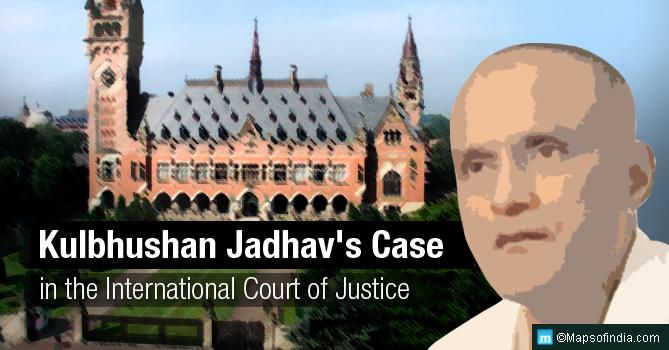Latest Update (18, May 2017) : In the latest development, the International Court of Justice has ordered Pakistan to ensure not to execute Kulbhushan Jhadav until a final decision is taken in the case. The world court also maintained that Pakistan should have given consular access to India.
One of the most important responsibilities of the government of any nation is to protect its people – both on its soil and overseas. It is with this attempt that the Indian government has approached the International Court of Justice (ICJ) after a gap of 18 long years.
Jadhav’s Case Heard At ICJ
Early last month, news reports revealed that Indian national and retired Navy officer, Kulbhushan Jadhav, who had been arrested in 2016 by Pakistan was sentenced to death by a military court. Jadhav has been accused of espionage and encouraging separatist tendencies (in Balochistan) by Pakistan. To support their claim, Pakistan had previously released a video with an alleged confession by Jadhav. India denies the claims and holds that the video is heavily doctored.
With public pressure mounting and Pakistan consistently denying consular access to Jadhav, India had no option but to seek the intervention of the International Court of Justice – judicial organ of the United Nations (UN) – headquartered at the Peace Palace in The Hague. India seeks that the ICJ place a stay order on the case. ICJ decided to hold an open hearing of the case. India and Pakistan were both given about 90 minutes each to briefly present the crux of the case and seek provisional measures favourbly ensuring that Jadhav is not executed before the ICJ delivers its verdict. The Indian legal team took the ICJ floor at 1.30 pm IST and consisted of Deepak Mittal and V D Sharma (agents of India at the ICJ), senior advocate Harish Salve and two others.
Crux of India’s Argument
India concentrated its argument around the core of the matter – Jadhav was not provided consular access – a violation of his rights accorded by the Vienna Convention on Consular Relations (VCCR), 1963. In fact, India was not informed of Jadhav’s arrest long after it occurred. Nor were Kulbhushan Jadhav’s parents granted visas to travel to Pakistan and meet their son. None of the requests made by India to Pakistan – providing Jadhav legal assistance by a counsel of his choice, providing India a copy of the charge sheet, FIR, verdict, or any investigative evidence implicating Jadhav as an Indian RAW agent – were met.
India also has observed, with a growing sense of panic, that over the past month over 18 executions (by Pakistan’s military court) have been reported by Pakistani media. India is now worried that Jadhav may also be executed before India is allowed an opportunity to vindicate its stand and Kulbhushan Jadhav’s innocence. Another matter to be considered here is that Iran (where Jadhav had been residing after his retirement from the Indian Navy) has not yet concluded its investigation of the issue. India contended at the ICJ that the military trial held by Pakistan was “farcical” and Jadhav had been kidnapped from Iran and not arrested in Balochistan as claimed by Pakistan.
India’s petition to the ICJ urges the international court to “restrain Pakistan from giving effect to the sentence and direct it to take steps to annul the decision.”
Pakistan’s Defence
Pakistan’s representatives took the floor in the second session. Pakistan’s representatives said that they lacked the time to come up with a structured response to India at the ICJ. They also argued that the laws and constitution of their country and that the 2008 bilateral agreement with India on consular access take precedence over the VCCR thereby making the investigation and trial a matter of national security. India, however, holds that Article 36 of the VCCR is sacrosanct and that the Indo-Pakistan agreement has not yet been registered with the UN Secretariat.
Pakistan claimed that it has a confession to support Jadhav’s and India’s involvement in espionage and the separatist movement in Balochistan. The ICJ, however, did not allow the Pakistani contingent to play the video of the alleged confession. Pakistan belittled India’s presentation calling it a technical argument alone.
Pakistan’s stand ever since India sought the intervention of the ICJ is that the international court has no jurisdiction to rule in a matter of Pakistan’s own internal security. India clearly focused on the fact that this is in fact the right place to judge the violation of the VCCR and lack of consular access – things that affect all the countries of the world.
The ICJ is yet to deliver a ruling in the matter and the world is looking at the 15 member bench to deliver an incisive judgement.
Both India and Pakistan are abiding members of the UN and signatories to the VCCR. What remains to be seen is if Pakistan will abide by the rulings of the ICJ afte questioning its jurisdiction in this matter. Currently the ruling only pertains to the provisional measures sought by India and the complete case is yet to be adjudged by the ICJ. Pakistan also has the option of denying any moral pressure and not abiding by the ICJ’s ruling but India can counter that by invoking Article 94 of the UN Charter and asking for the international community to place sanctions against Pakistan.
The last time India and Pakistan clashed at the ICJ was in 1999 over the shooting of the Pakistan Naval Aircraft, the Atlantique, by the Indian Air Force over Indian airspace. The ICJ had at the time upheld the Indian view and dismissed Pakistan’s claim of USD 60 million in damages.





